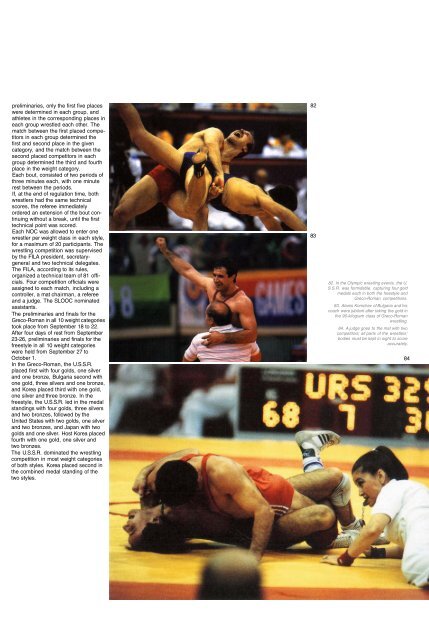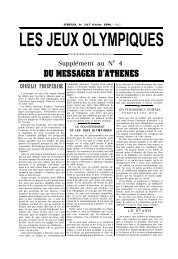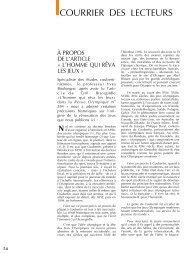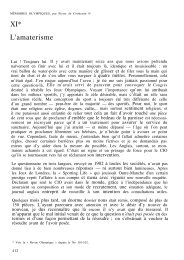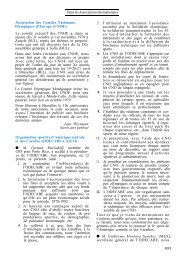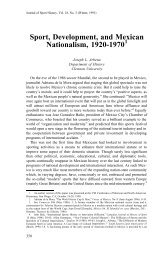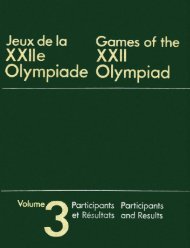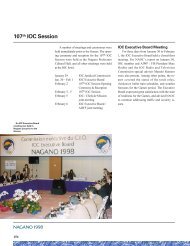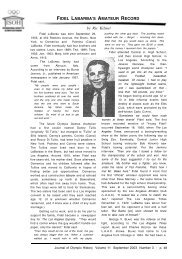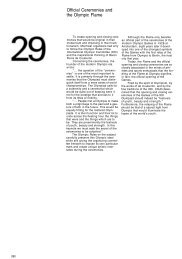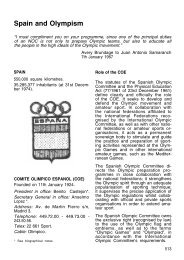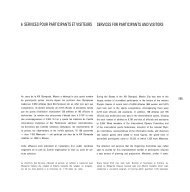Part 2 - LA84 Foundation
Part 2 - LA84 Foundation
Part 2 - LA84 Foundation
You also want an ePaper? Increase the reach of your titles
YUMPU automatically turns print PDFs into web optimized ePapers that Google loves.
preliminaries, only the first five places<br />
were determined in each group, and<br />
athletes in the corresponding places in<br />
each group wrestled each other. The<br />
match between the first placed competitors<br />
in each group determined the<br />
first and second place in the given<br />
category, and the match between the<br />
second placed competitors in each<br />
group determined the third and fourth<br />
place in the weight category.<br />
Each bout, consisted of two periods of<br />
three minutes each, with one minute<br />
rest between the periods.<br />
If, at the end of regulation time, both<br />
wrestlers had the same technical<br />
scores, the referee immediately<br />
ordered an extension of the bout continuing<br />
without a break, until the first<br />
technical point was scored.<br />
Each NOC was allowed to enter one<br />
wrestler per weight class in each style,<br />
for a maximum of 20 participants. The<br />
wrestling competition was supervised<br />
by the FILA president, secretarygeneral<br />
and two technical delegates.<br />
The FILA, according to its rules,<br />
organized a technical team of 81 officials.<br />
Four competition officials were<br />
assigned to each match, including a<br />
controller, a mat chairman, a referee<br />
and a judge. The SLOOC nominated<br />
assistants.<br />
The preliminaries and finals for the<br />
Greco-Roman in all 10 weight categories<br />
took place from September 18 to 22.<br />
After four days of rest from September<br />
23-26, preliminaries and finals for the<br />
freestyle in all 10 weight categories<br />
were held from September 27 to<br />
October 1.<br />
In the Greco-Roman, the U.S.S.R.<br />
placed first with four golds, one silver<br />
and one bronze, Bulgaria second with<br />
one gold, three silvers and one bronze,<br />
and Korea placed third with one gold,<br />
one silver and three bronze. In the<br />
freestyle, the U.S.S.R. led in the medal<br />
standings with four golds, three silvers<br />
and two bronzes, followed by the<br />
United States with two golds, one silver<br />
and two bronzes, and Japan with two<br />
golds and one silver. Host Korea placed<br />
fourth with one gold, one silver and<br />
two bronzes.<br />
The U.S.S.R. dominated the wrestling<br />
competition in most weight categories<br />
of both styles. Korea placed second in<br />
the combined medal standing of the<br />
two styles.<br />
82<br />
83<br />
82. In the Olympic wrestling events, the U.<br />
S.S.R. was formidable, capturing four gold<br />
medals each in both the freestyle and<br />
Greco-Roman competitions.<br />
83. Atanis Komchev of Bulgaria and his<br />
coach were jubilant after taking the gold in<br />
the 90-kilogram class of Greco-Roman<br />
wrestling.<br />
84. A judge goes to the mat with two<br />
competitors; all parts of the wrestlers'<br />
bodies must be kept in sight to score<br />
accurately.<br />
84


